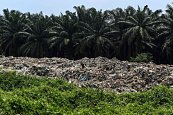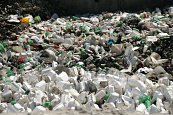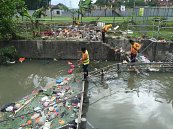Recyclers Cringe as Southeast Asia Says It’s Sick of the West’s Trash
Published on 07 June 2019
Within months, Malaysia, which has a sizable ethnic Chinese population, had replaced China as the world’s largest importer of plastic scrap. But this country, and others across the region, soon saw the waste as an environmental nightmare, and a heavy backlash has begun. With public support, some advocacy groups have urged officials to permanently ban the import of plastic waste.
But at a time when the world is awash in such plastic, some experts worry that this backlash could block the flow of raw material to Southeast Asia’s aboveboard recyclers and manufacturers — and raise the chances that plastic scrap will end up in rivers, oceans, dumps and illegal burn sites.
"Reading the Tea Leaves" with Single Use Plastic
Published on 22 June 2018
On a daily basis, more people are impacted by trash and dirty water than by climate change. This is not to say that one problem is bigger than the other, but plastic pollution is one of the more complicated issues to solve as it is so widely dispersed.
Dirty water from trash impacts drinking water, hygiene, disease, tourism, and air pollution from open-pit burning of trash. It also impacts fishing, agriculture, maritime transport, and ecosystems on land and water, and the carrying of toxicity in broken-up micro plastic, which has entered the human food chain.
Energy and Plastic Waste Crisis Could Be Reduced via Waste-to-Energy
Published on 17 October 2017
Waste-to-energy is not a new concept, yet despite successful operations globally, it is often not on the radar of many governments as an option. This is unfortunate, as the opportunity exists to both effectively remove plastic pollution, while simultaneously supporting some of the local energy needs in the wake of the decommissioning of coal-fired generators. It can also simply help to fill the increased demand of a growing consumer population, and can even be made into road-ready fuel by smart technology like that of Australia’s Integrated Green Energy Solutions Ltd.
Sustainability Efforts Reshaping Some Brands’ Food Packaging
Published on 01 May 2017
Brand owners and major retailers are responding to consumer demands and increasingly stepping up to “do the right thing” environmentally as they publicly commit to sustainable food packaging. These initiatives are designed to reduce packaging waste and encourage a shift to the circular economy.
The goal of the circular economy – currently a better-known concept in Europe than in North America – is to move from our traditional take-make-dispose economy, to one that has a closed loop, where materials, nutrients and data are continuously repurposed. One impact of such a concept is that it encourages greater use of biopolymers and recycled content in all appropriate types of packaging, including in food and beverage packaging.
"Plasticity Light" on Facebook Live - Summary Session for the Public at Earth Day Texas
Published on 22 April 2017
Watch the “Plasticity Light” session, held on Saturday for the public at Earth Day Texas (April 22nd). You can view the 90min session on Facebook Live, starting at the 1hr 25min mark.
This was a summary of Plasticity, with a few of our conference speakers: Stuart Clark of FOY Group, Trish Hyde of the Australian Packaging Covenant, Rachael Miller of Rozalia Project, Alvaro De Marichalar, and Bob Grace, of RC Grace Ltd., and Doug Woodring, Founder of the Plasticity Forum.
Earth Day Texas Event in Dallas Brings Together Experts to Tackle Plastic Pollution at Scale
Published on 21 April 2017
Plastic is among the most common types of pollution on Earth and is rapidly making its way into the oceans. Research published in the journal Science estimated that at least 5.3 million tons of plastic debris entered the world’s oceans in 2010.
On Friday, several environmentalists, financial experts and companies that manufacture and use plastic will meet in Dallas to work on tackling plastic pollution and potentially slow that flow.
Plastic Opportunities for Change
Published on 15 April 2017
Whether or not the ocean and our waters upstream are drivers for needed improvements in plastic pollution reduction, the health of our communities, and the customers we all need, should be incentive enough to demand and encourage management to really focus on being an active participant in the circular economy. Plastic pollution is now on the top of many environmental agendas, as it directly impacts the abilities of cities to be resilient, and “smart.” Governments can facilitate circularity and waste avoidance, but it is the private sector which will thrive on it once some good case studies are promoted, scaled and replicated.








